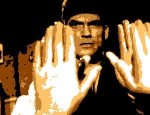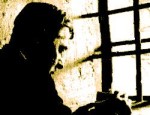Film Review
Here is a film whose premise appears, on the face of it, to be
completely bonkers. Take a glamorous world-renowned actress, a
film star who, in some people's eyes, is the epitome of western
privilege and decadence, and induce her to go on a sightseeing
tour of the bombed out carcass of a war-ravaged Middle East
country. So as not to make the experience of witnessing death, misery and
destruction too easy, let the aforementioned actress be accompanied by a
man who can only just about speak her language and is such a fan of
hers that he can recite whole chunks of dialogue from films she made
forty years ago. Less implausible scenarios than this have been
rejected by the makers of
The
Simpsons. Yet from this insane concept has sprung one of
the most incisive and poignant reflections on how the Middle East is
seen by the West, a film that is more authentic and more revealing than
the hours of BBC news footage that have saturated our TV screens and
our minds over the past decade.
Je veux voir was originally
conceived as a fifteen-minute short but was expanded when its
directors, Joana Hadjithomas and Khalil Joreige, realised they had
amassed enough material of sufficient quality for a feature.
Hadjithomas and Joreige are the team who had previously distinguished
themselves with
Autour de la maison
rose (1999) and
A perfect day
(2005). They were inspired to make
Je veux voir at the time of the
2006 war between Israel and Hezbollah, which saw regions of southern
Lebanon devastated by Israeli bombing. Their intention was to
capture on film history as it was being made, not merely to make a
documentary but to show how a historical perspective is forged from the
drama of the moment and people's immediate reaction to it.
When Catherine Deneuve was approached to appear in this film, she
accepted almost without a moment's hesitation. Despite her iconic
status, the actress has a history of agreeing to take on unusual roles in low
budget and low profile productions, something that has earned her a
reputation as a free spirit and true friend of independent
cinema. Deneuve's co-star here is the successful Lebanese
actor and writer, Rabih Mroué. The difficulty that
the two actors have in communicating (Mroué can just about make
himself understood with his very limited French) creates a distance
between them which serves the film well, standing as a metaphor for the
West's inability to understand the problems of the Middle East.
Je veux voir is a vague mix of
road-movie and travelogue which powerfully evokes the West's
ambivalence towards the Middle East. There is something oddly
surreal in the spectacle of a screen goddess
being manoeuvred around ruins, landmines and cluster bombs by her
entourage who appear distinctly blasé about the prospect of
being blown
to pieces. As she heads off into the urban wreck that is Beirut, a subtly
aloof Deneuve claims that she wants to
see, but we never know what it is
she is looking for or hopes to gain from her impromptu exploration of a
war-scarred country. The film is as much a tribute to a beautiful
region that has been virtually devastated by conflict as it is a
statement of the West's inability to fully engage with
the Middle East. Of course we want to see, but do we really want
to get involved? Watching this eccentric but moving little film
is an intense and shaming experience.
© James Travers 2010
The above content is owned by frenchfilms.org and must not be copied.
Film Synopsis
The world famous actress Catherine Deneuve is in Beirut to attend
a charity gala. Before the gala, she insists on making
a tour of Lebanon, so that she can see something of the people and the land that
have been ravaged by years of bloody conflict. Accompanied by another actor, Rabih
Mroué, she sets out on a life-changing voyage of discovery...
© James Travers
The above content is owned by frenchfilms.org and must not be copied.



